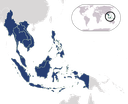Summer Term 2012
Political Science
International relations of Southeast Asia and regional integration in ASEAN
Dr. Paruedee Nguitragool, Gabriela Manea
Time/ Place: The course will be held as ‘Blockseminar' on Thursday 3rd, 10th, 24th of May and
14th, 21st, 28th of June 2012, from 10 to 14 hrs., 10-14h, Hermann-Herder-Str. 9 - HS 01 020b
Language: English
Summary: The course is an introduction to the international relations of Southeast Asia and regional integration in ASEAN (Association of Southeast Asian Nations). This approach highlights cultural and historical factors accounting for local patterns of regional politics and regionalism by discussing three dimensions of Southeast Asian regional dynamics. Firstly, it analyzes the relationship between domestic political and cultural representations and foreign policy identities of Southeast Asian states as we assume that the patterns of interstate interaction and states' approach to regional integration in Southeast Asia are being substantially shaped by domestic cultural and historical path-dependencies. Secondly, the course will discuss the process of regional integration in Southeast Asia with regard to political, economic and socio-cultural intra-regional cooperation. We will ask the question of the extent to which are there new transnational political, economic and normative discourses and institutions emerging or already being consolidated at the regional level. Thirdly, the course will take a closer look at the embedment of the Southeast Asian sub-system of international relations and ASEAN in the world politics. Regional responses to global challenges as well as to external ‘power complexes', such as China, the EU and US will complement our understanding of Southeast Asian intra-regional politics and inter-state relations. At the theoretical level, the course introduces students to conceptual approaches drawing on IR theories, regionalism and foreign policy research that are supporting our explanations of Southeast Asian politics and regional integration processes. Apart from perusing main scholarly literature on these topics, students will be encouraged to conduct documentary and newspapers analysis.
Literature:
Acharya, Amitav (2000): The Quest for Identity: International Relations of Southeast Asia, Singapore: Oxford University Press.
Acharya, Amitav (2009): "How ideas spread: Whose norms matter? Norm localization and institutional change in Asian regionalism", International Organization 58 (2): 239-275.
Booth, Anne E. (2007): Colonial legacies: economic and social development in East and Southeast Asia, Honolulu: University Press of Hawaii Press.
Kingsbury, Damien (2005): Southeast Asia: a political profile, Oxford: Oxford University Press
Kuhonta, Erik Martinez; Slater, Dan and Vu, Tuong eds. (2008): Southeast Asia in Political Science: Theory, Region, and Qualitative Analysis, Stanford: Stanford University Press.
Jetschke, Anja and Rüland, Jürgen (2009): „Decoupling rhetoric and practice: the cultural limits of ASEAN cooperation", The Pacific Review 22(2): 179-203.
Rodan, Garry; Hewison, Kevin and Robison, Richard (2006): The Political Economy of Southeast Asia: markets, power and contestation, Oxford: Oxford University Press.
Stubbs, Richard (2008): "The ASEAN Alternative? Ideas, institutions and the challenge to ‘global' governance", The Pacific Review 21 (4): 451-468
Weatherbee, Donald E. (2009): International relations in Southeast Asia: the Struggle for Autonomy, New York: Rowan & Littlefield.
Registration: for registration send an email to both paruedee@nighlabs.de and gabriela.manea@politik.uni-freiburg.de and in the first session
China in Asien
Dr. Kristin Kupfer, Mikko Huotari
Time/ Place: Weekly every Thursday, 10-12h
Language: German
Summary: Um Chinas Rolle in der Welt zu analysieren, muss man in Asien anfangen. Nicht nur geographisch bildet die Region das primäre Bezugsfeld für die Volksrepublik . Die Bandbreite der Charakterisierungen des Verhältnisses Chinas zur Region reicht von beängstigender Hegemonie zu intensiver und vielfältiger Kooperation. Dahinter verbergen sich jedoch komplexe Zusammenhänge.
Ziel des interdisziplinären Seminars ist deshalb eine umfassende Analyse der soziokulturellen, wirtschaftlichen und politischen Verflechtung, zwischen China und der Region. Teilnehmende Studierende bekommen die Gelegenheit das Potential der Verbindung verschiedener Perspektiven -- von „Area Studies" (Sinologie) und „Disziplin" (Politikwissenschaft) - selbst zu evaluieren. Theoretische Perspektiven und empirische Detailkenntnis sollen zusammen geführt werden. Auf der Basis eines historischen Überblicks über Chinas Rolle in Asien (Teil 1) werden Ziele und Interessen der Außenpolitik Chinas in Asien untersucht .Dabei liegt ein Schwerpunkt auch auf den innerchinesischen Diskursen (Teil 2). Im letzten Teil des Seminars werden in Fallstudien aktuelle Handlungsfelder Chinas in der Region genauer betrachtet (Teil 3).
The Political Economy of Institutional Change - New Democracies in Southeast Asia and the Middle East
Dr. Christian von Lübke
Time/ Place: Weekly every Tuesday, 16-18h, Wilhelmstr. 26 - HS 00 016
Language: English
Summary: Recent developments in Southeast Asia and the Middle East provide valuable insights into the political economy of institutional change. The dynamics in these two regions - including Indonesia's emergence as the world's third largest democracy, Thailand's revolts and institutional backsliding, Turkey's oscillations towards and away from authoritarian rule, and the seismic shifts in the wake of the Arab Spring - offer valuable vantage points for the study of democratic transition. In this seminar, students will be introduced to a variety of theoretical and empirical literatures. These include explanatory frameworks pertaining to institutional rules, political agents, ideational underpinnings, as well as socio-economic topographies. By the end of the seminar, students will have gained a deeper understanding of what drives institutional change in the context of Southeast Asian and Middle Eastern polities.
Literature:
Anderson, L. (2011). ‘Demystifying the Arab Spring', Foreign Affairs, Vol 90, No. 3: 2-7.
Case, W. (2009). ‘Low-Quality Democracy and Varied Authoritarianism: Elites and Regimes in Southeast Asia Today', Pacific Review, Vol. 22 No. 3 (pp. 255-269).
Diamond, L. (2010). "Liberation Technology." Journal of Democracy 21(3): 69-83.
Huntington, S. (1991). The Third Wave: Democratization in the late 20th Century. Norman: University of Oklahoma Press.
Olson, M. (1993). "Dictatorship, Democracy and Development." American Political Science Review, 87,
(pp. 567-576).
Schmitter, P. and T. Karl (1991). ‚‘What Democracy is - and what it is not'. Journal of Democracy, Vol. 2(3): 75-88.
Registration: christian.von.luebke@politik.uni-freiburg.de
Social and Cultural Anthropology
Vorbereitung einer Lehrforschung in Indonesien - Wahrnehmungen von Globalisierungsprozessen
Prof. Dr. Judith Schlehe
Time/ Place: Weekly every Thursday, 16-18h, Werthmannstr. 10 - HS 01 009
Language: German
Asian History
Der Kalte Krieg in Asien
Sören Urbansky
Time/ Place: Weekly every Monday, 10-12h, Breisacher Tor - Raum 201
Language: German
Summary: Als „Kalter Krieg" wird gemeinhin der kriegsähnliche Zustand des Staatensystems zwischen dem Ende des Zweiten Weltkriegs und dem Fall der Berliner Mauer bezeichnet, bei dem die zwei Supermächte UdSSR und USA mit ihren militärischen Bündnispartnern versuchten, den Einfluss des Gegners einzudämmen, ohne dass es dabei zu direkten offenen Kampfhandlungen zwischen Moskau und Washington kam.
Der Kalte Krieg hatte seinen Ursprung in Europa. Doch nach dem Sieg über Japan entstand auch in Ostasien ein neues Kräftegleichgewicht, in dem die USA versuchten, den Einfluss der beiden großen kommunistischen Staaten einzudämmen. Im engen Zusammenhang mit diesem Wettstreit stand das Ende der Kolonialherrschaft. Rasch emanzipierten sich die jungen Staaten von bloßen Objekten geopolitischer Interessen zu außerhalb des bipolaren Systems agierenden Subjekten. Insbesondere Peking, das seit dem Zerwürfnis mit Moskau als dritter großer Akteur die Entwicklung der Region bestimmte, verfolgte eine zunehmend souveräne außenpolitische Agenda. Das Ende des Kalten Krieges schließlich war anders als in Europa nicht begleitet vom Zusammenbruch der wichtigen kommunistischen Regime Ostasiens - mit Folgen bis in die Gegenwart.
Anhand der Lektüre vorwiegend englischsprachiger Texte werden wir untersuchen, welche Auswirkungen einerseits die Konfrontation der beiden Supermächte auf diese Weltregion hatte und wie die Staaten Ostasiens andererseits das Verhältnis zwischen den Vereinigten Staaten und der Sowjetunion prägten. Im Zentrum stehen diplomatie-, sozial- und kulturhistorische Facetten der Geschichte des Kalten Krieges in Ostasien, die durch Recherchen in über das Internet zugänglichen Archivbeständen ergänzt werden.
Literature:
Mark Borthwick (Hg.): Pacific Century. The Emergence of Modern Pacific Asia. Boulder: Westview Press 1998; Chen Jian: Mao's China and the Cold War. Chapel Hill: University of North Carolina Press 2001; Michael Yahuda: The International Politics of A









